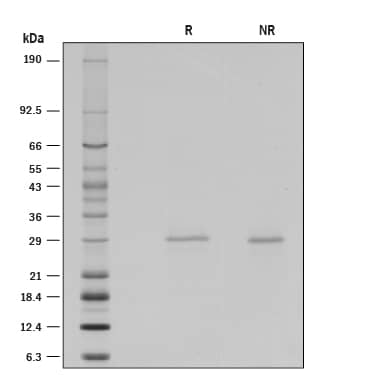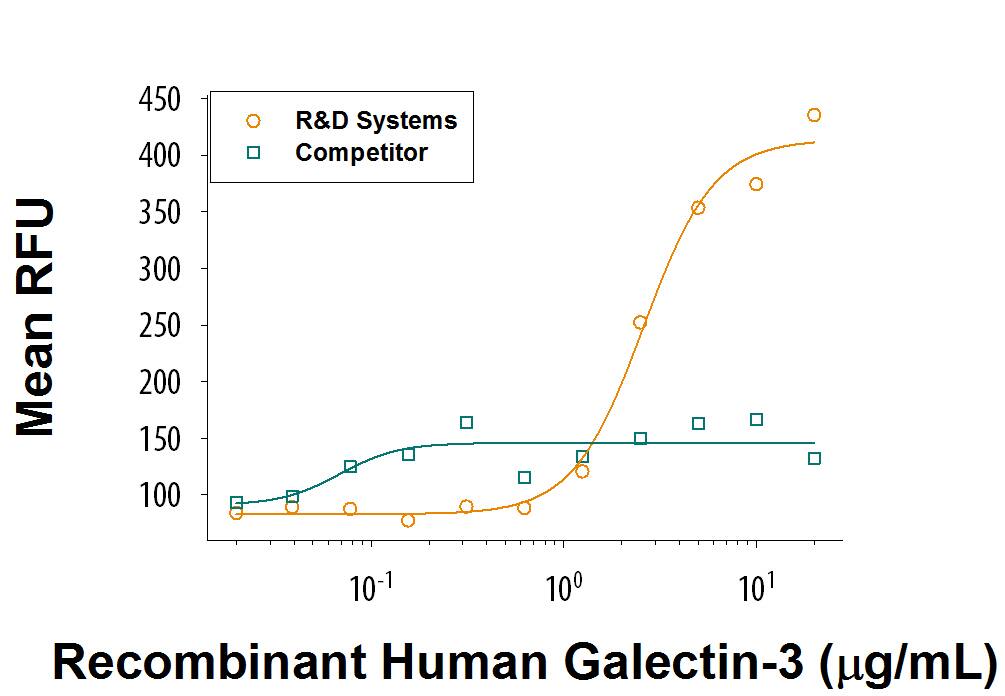Recombinant Human Galectin-3 (Human Cell-expressed), CF Best Seller
R&D Systems, part of Bio-Techne | Catalog # 8259-GA

Key Product Details
Product Specifications
Source
Ala2-Ile250
Purity
Endotoxin Level
N-terminal Sequence Analysis
No results obtained: Ala2 predicted.
Predicted Molecular Mass
SDS-PAGE
Activity
The ED50 for this effect id 0.6-3 μg/mL.
Measured by its ability to agglutinate human red blood cells. Hadari, Y.R. et al. (2000) J. Cell Sci. 113:2385.
The ED50 for this effect is 3-10 μg/mL.
Reviewed Applications
Read 1 review rated 4 using 8259-GA in the following applications:
Scientific Data Images for Recombinant Human Galectin-3 (Human Cell-expressed), CF
Recombinant Human Galectin-3 (Human Cell-expressed) Bioactivity
Recombinant Human Galectin-3 (Catalog # 8259-GA) supports the adhesion of MOLT‑4 human acute lymphoblastic leukemia cells. The ED50 for this effect is 0.6-3 μg/mL, while competitor's protein shows very weak activity.Recombinant Human Galectin-3 (Human Cell-expressed) SDS-PAGE
1 μg/lane of Recombinant Human Galectin-3 was resolved with SDS-PAGE under reducing (R) and non-reducing (NR) conditions and visualized by silver staining, showing single bands at 29.9 kDa and 29.8 kDa, respectively.Formulation, Preparation and Storage
8259-GA
| Formulation | Lyophilized from a 0.2 μm filtered solution in HEPES, NaCl, TCEP, PEG and Trehalose. |
| Reconstitution |
Reconstitute at 100 μg/mL in PBS.
|
| Shipping | The product is shipped with polar packs. Upon receipt, store it immediately at the temperature recommended below. |
| Stability & Storage | Use a manual defrost freezer and avoid repeated freeze-thaw cycles.
|
Background: Galectin-3
Human Galectin-3, also known as Mac-2, L29, CBP35, and epsilonBP, is classified as a chimeric member of the Galectin superfamily and contains one carbohydrate recognition domain (CRD) linked to a nonlectin domain (1, 2). Mature human Galectin-3 shares 78% and 79% amino acid (aa) sequence identity with mouse and rat Galectin-3, respectively. Human Galectin-3 is a 26 kDa protein that can be nuclear, cytoplasmic, or secreted (3, 4). Nuclear Galectin-3 can modulate gene expression, while cytosolic Galectin-3 can inhibit apoptosis and can participate in exocytosis, Caveolin-mediated endocytosis, and macrophage-mediated clearance of apoptotic cells (5-7). Extracellular Galectin-3 has been shown to form high-order oligomers that promote the crosslinking of cell surface oligosacchraides as well as integrin-dependent cell adhesion and apoptosis (8-11). Galectin-3 contributes to the innate immune response against Candida albicans and Streptococcus pneumoniae, and it can facilitate acute inflammatory responses via neutrophil activation and opsonization, macrophage recruitment, and mast cell activation (12-14). Galectin-3 can also contribute to chronic inflammation and fibrosis (15). It is implicated in neuroinflammatory disorders of the central nervous system, cardiac fibrosis, and heart failure, as well as tumor growth, progression, and metastasis (16-18).
References
- Robertson, M.W. et al. (1990) Biochemistry 29:8093.
- Elola, M.T. et al. (2007) Cell. Mol. Life Sci. 64:1679.
- Haudek, K.C. et al. (2010) Biochim. Biophys. Acta 1800:181.
- Hughes, R.C. (1999) Biochim. Biophys. Acta 1473:172.
- Krzeslak, A. and A. Lipinska (2004) Cell. Mol. Biol. Lett. 9:305.
- Dumic, J. et al. (2006) Biochim. Biophys. Acta 1760:616.
- Sano, H. et al. (2003) J. Clin. Invest. 112:389.
- Ahmad, N. et al. (2004) J. Biol. Chem. 279:10841.
- Friedrichs, J. et al. (2008) J. Biol. Chem. 283:32264.
- Wen, Y. et al. (2006) J. Cell. Biochem. 98:115.
- Zhuo, Y. et al. (2008) J. Biol. Chem. 283:22177.
- Henderson, N.C. and T. Sethi (2009) Immunol. Rev. 230:160.
- Kohatsu, L. et al. (2006) J. Immunol. 177:4718.
- Nieminen, J. et al. (2008) J. Immunol. 180:2466.
- Henderson, N.C. et al. (2008) Am. J. Pathol. 172:288.
- Newlaczyl, A.U. and L.G. Yu (2011) Cancer Lett. 313:123.
- Sherwi, N. et al. (2012) Future Cardiol. 8:885.
- Shin, T. (2013) Acta Histochem. 115:407.
Alternate Names
Gene Symbol
UniProt
Additional Galectin-3 Products
Product Documents for Recombinant Human Galectin-3 (Human Cell-expressed), CF
Product Specific Notices for Recombinant Human Galectin-3 (Human Cell-expressed), CF
For research use only

